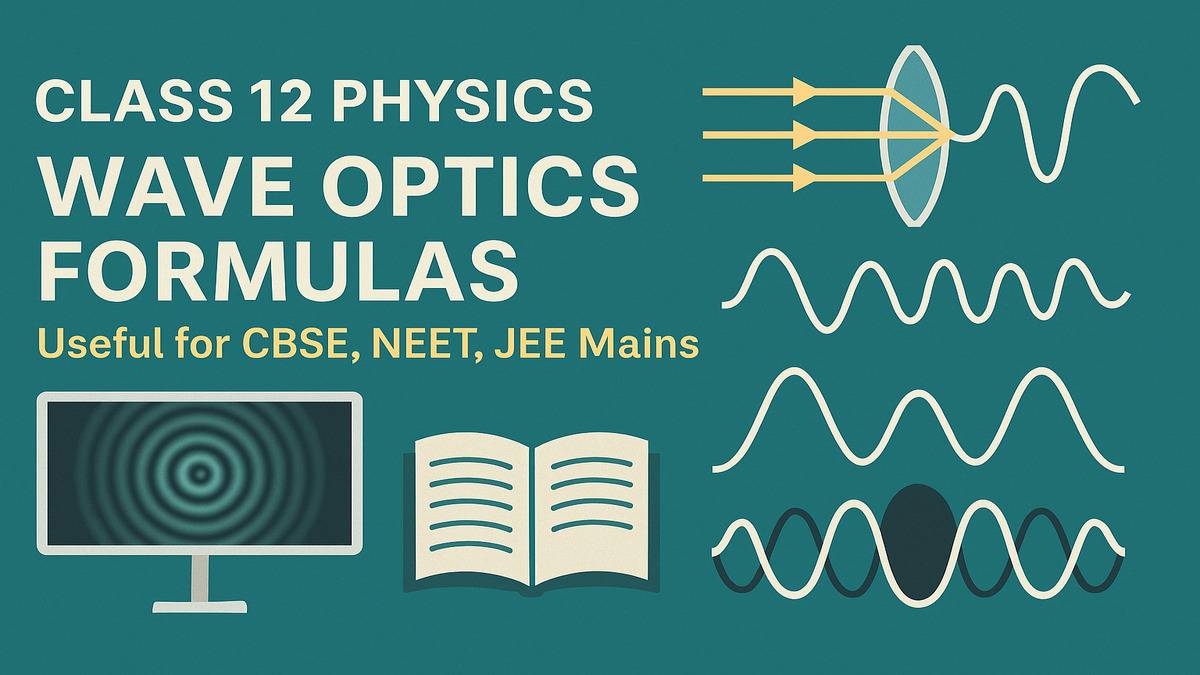Class 12 Physics Wave Optics Formulas
Wave Optics is one of the most scoring chapters for CBSE students. It also has significant weightage in entrance exams such as NEET and JEE Mains. Master all the wave optics class 12 formulas and practice the NCERT exercise to get full marks in this chapter. Read Below:
The Chapter 11 of Class 12 Physics includes several important topics such as Interference, Diffraction, and Polarisation. Frequently conceptual and numerical problems are asked from these topics. Access all Wave Optics Formulas for Class 12 and practice numericals with ease.
You can take help of not only formulas but our specially curated NCERT Solutions for this chapter to clear your doubt and prepare along the NCERT Lines. One good piece of advice you can take, Learn concepts first through topic-wise NCERT Notes and then use this page for revision and practice.

- Huygens Principle
- Interference
- Young Dual Slit Experiment [YDSE]
- Single Slit Diffraction
- Polarisation
Huygens Principle
It states that every point on a wavefront acts as a source of secondary wavelets.
Wavefront: It is a surface as a set of points with a constant (same) phase.
Amplitude and Wavefront:
- Spherical Wavefront: A ∝ 1/ r
- Cylindrical Wavefront: A ∝ 1/ √r
Interference
In this phenomenon where two or more light waves combine to form a new wave pattern with diffrent intensity.
Basic Concepts
- Coherent sources: They have the same frequency with a constant phase difference.
- Resultant Intensity when two light waves interfere:
- If amplitudes are and
- Relation between Intensity and Amplitude:
Constructive Interference
- Path Difference between two waves:
- Amplitude ( ):
- Intensity ( ):
Destructive Interference
- Path Difference
- Amplitude ( Δϕ= π):
- Intensity ( Δϕ=π):
Young Dual Slit Experiment [YDSE]
The experiment was designed to show the wave nature of light, by letting it pass through 2 slits and form a interference pattern.
- Fringe Width:
- Angular Fringe Width
- Position of the nth bright fringes:
- Position of Dark Fringes:
- Path Difference
Resultant Intensity for two same amplitude waves:
| Related Class 12 Physics Wave Optics Study Material |
|---|
| Wave Optics NCERT Exemplar Solutions |
| Class 12 Wave Optics NCERT Solutions |
| Class 12 Physics Chapter 10 NCERT Notes |
| Chapter 10 Class 12 Physics- Quick Revision Notes |
Single Slit Diffraction
Instead of 2 slits, one single slit is used to showcase difffraction of light {bending of light when passing through small openings}.
- Angular Width of Central Maxima
- Width of Central Maxima
- Intensity Distribution at an angle
- Diffraction Equation for Grating
Polarisation
A process of restricting vibration of light waves in multiple perpendicular planes, and keeping it fixed to one single perpendicular plane.
- Displacement in z-direction {(z-polarized wave) travelling along the x or y axis.}
- Malus’s Law : Intensity after passing through two polaroids
- Intensity through Three Polaroids when middle polaroid at angle θ:

